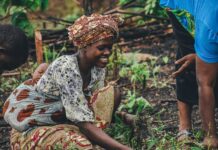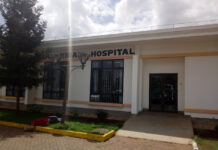By Amadu Massally and Claudia Shilumani
Continental use of facial masks could be an answer to Africa’s prayers.
Africa has the opportunity to stop the coronavirus by using a strategy in many other countries in the world that have not used enough. That is to make the wearing of masks in public spaces mandatory for a defined period.
Not only is it the most economical way to address the problem in the advent of very scarce resources, but this simple change of habit could end up saving tens of thousands, if not millions of lives. The understanding now that asymptomatic carriers of the coronavirus may be infecting people, unknowingly, requires different thinking and especially approaches to stop the spread of COVID19.
If Africa knows nothing about this disease, but it knows the challenge of stressed the public health systems of the world powers her countries can only dream of at this time.
In addition, it is clear that trying to chase the disease is not prudent. As world cases and deaths continue to rise unabated. Not to mention the huge financial burden it imposes if the Continent is to play catch-up. Africa’s best option is to wear masks even if they are homemade.
The use of the head tie, scarves, handkerchiefs, are all useful. One or more of these are instantly available to many households even the poorest on the Continent.
However, just like in the case of Ebola, where messages and actions by the global community were lacking effective execution, especially in the beginning. The World Health Organization may have missed this sound advice to use masks. But instead, they urged people not to use them. They are not the only ones. The Center for Diseases and Control (CDC) and even the US Surgeon General and others have warned against the use of masks. Did they make a mistake?

That the virus may spend some time in the air, particularly with the release of micro-droplets on one hand and on the other that an asymptomatic case may spread the disease unbeknown to anyone are two critical new understandings. That makes masks more important than washing hands in curbing the disease although they are most effective when done together.
Masks address the fundamental problem by stopping or limiting the disease in a huge way by eliminating or minimizing droplets through sneezing, coughing or even breathing as we have recently learned. Face- masks can suppress the infection from its source, as we just illustrated. Scientists have proven some of it.
In the Czech Republic, they are actually urging other countries to sew their own masks. They believed the use of masks is a difference-maker and they started a campaign #Masks4All. According to Dr. Vladimir Zdi- mal, Head of the Department of Chemistry and Aerosol Physics at the Czech Academy of Science.
“Home masks can stop up to 100% of the spread of potentially infected microdroplets,” says Dr. Vladmir.
Dr. Emil Pavlik a Microbiologist and Virologist emphasis the use of masks saying “The more people use masks the less virus can be distributed and fewer individuals are exposed.”
Even the Minister of Health had one on in a video and urging all other government officials to do similarly that is profound.
The other day the Government of Sierra Leone adopted the use of a facemask for all government Ministers, which we hope they can extend to the whole country needs them. In South Africa, security personnel is seen wearing masks as they patrol the streets under the lockdown.
Until a couple of days ago, the authors sort of had a bulb turned on in their heads when it was revealed that the use of masks may be an answer to many prayers for Africa.
“I always thought I was the only protecting myself by wearing a mask so when I see, people without masks on, I think they are treading dangerously. True they are, but they are more of a danger to me than I am to them with my mask! It is clearer now to me that with a mask on, we protect each other from a reverse logic understanding since we do not know who has it or not” says Amadu Massally.
Eventually, most of those who become sick from the virus would heal. Most people recover at home, some after a visit to the hospital, and others after critical ICU care. Some still succumb to the disease as they meet their demise, even with care.
In Africa, with almost all the countries are operating in compromised public health infrastructure and systems, coupled with already existing disease burdens, the coronavirus does not bode well if the worse happens. We cannot afford to play catch up like the rest of the world is. Therefore, as the disease crawls into the Continent, at a minimum we can encourage, if not enforce the use of masks, even makeshift ones to save lives we can never bring back.
In summary, with the use of masks there may be little or no microdroplets floating in the air in enclosed spaces especially from asymptomatic carriers, the less we have to worry about stuff landing around your eyes, nose, and mouth. Alternatively, on your hand during a handshake, because someone coughed into their hands.
In addition, minimized droplets on surfaces because there would be hardly any spurting around from uncovered sneezes and/ coughs or breathing even is valuable. The authors strongly recommend that Africa adopt a masking strategy to defeat the virus by stopping its spread and thereby saving trillions of US dollars and millions of lives! Will Africa listen?
The writer Amadu is a Certified Information Systems Auditor (CISA), and is Managing Partner at TpISENT; a management consultant company. He has work experience in both the United States and his native Sierra Leone.
The Writer Claudia is a Public Health Specialist based in South Africa and currently supporting the Government to fight COVID-19. She worked as an Advisor at the Ministry of Health and Sanitation in Sierra Leone during the Ebola Outbreak that rampaged Sierra Leone, Liberia, and Guinea.














